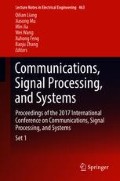Abstract
Channel coding is a way of encoding data in a communication channel that adds patterns of redundancy into the transmission path to lower the error rate. Such methods are widely used in wireless communications. In this paper, an effort has been made to estimate the reliability of channel using the concept of channel polarization on polar codes. The legacy coding schemes like Turbo and LDPC codes outperform the basic polar codes successive cancellation decoding algorithm. A performance analysis has been to compare the schemes and it has been shown that there is a need to improve the basic successive cancellation decoder in terms of error performance for channel coding, as a result of which the performance of List decoding has been proven to outperform the basic decoding scheme but with a higher decoding complexity.
Access this chapter
Tax calculation will be finalised at checkout
Purchases are for personal use only
References
Arikan, E.: Channel polarization: a method for constructing capacity-achieving codes for symmetric binary-input memoryless channels. IEEE Trans. Inf. Theory 55(7), 3051–3073 (2009)
Tal, I., Vardy, A.: List decoding of polar codes. In: 2011 IEEE International Symposium on Information Theory Proceedings (ISIT), pp. 1–5. IEEE (2011)
Polar codes tutorial by E. Arikan at UC Berkely. https://simons.berkeley.edu/sites/default/files/docs/2691/slidesarikan.pdf
Early-trends-in-5 g-technology-leadership. https://knect365.com/5g-virtualisation/article/1a7b1504-12db-47ba-9ecf-aacad96c3582/early-trends-in-5g-technology-leadership
Dizdar, O., Arıkan, E.: A high-throughput energy-efficient implementation of successive cancellation decoder for polar codes using combinational logic. IEEE Trans. Circ. Syst. I Regul. Pap. 63(3), 436–447 (2016)
Pamuk, A.: An FPGA implementation architecture for decoding of polar codes. In: 2011 8th International Symposium on Wireless Communication Systems (ISWCS), pp. 437–441. IEEE (2011)
Eslami, A., Pishro-Nik, H.: A practical approach to polar codes. In: 2011 IEEE International Symposium on Information Theory Proceedings (ISIT), pp. 16–20. IEEE (2011)
Lin, J., Zhiyuan, Y.: An efficient list decoder architecture for polar codes. IEEE Trans. Very Large Scale Integr. (VLSI) Syst. 23(11), 2508–2518 (2015)
Leroux, C., Raymond, A.J., Sarkis, G., Gross, W.: A semi-parallel successive-cancellation decoder for polar codes. IEEE Trans. Signal Process. 61(2), 289–299 (2013)
Trifonov, P.: Efficient design and decoding of polar codes. IEEE Trans. Commun. 60(11), 3221–3227 (2012)
Tal, I., Vardy, A.: How to construct polar codes. IEEE Trans. Inf. Theory 59(10), 6562–6582 (2013)
Forward Error Correction Wikipedia. http://en.wikipedia.org/wiki/Forward_error_correction
Lecture Notes on Channel Coding Schemes by Prof. Dr. Qilian Liang EE6367 University of Texas Arlington
Polar codes 1.1.0 C ++ implementation of modules for polar code. http://users.ecs.soton.ac.uk/rm/wp-content/PolarCode/index.html
Vangala, H., Hong, Y., Viterbo, E.: Efficient algorithms for systematic polar encoding. IEEE Commun. Lett. 20(1), 17–20 (2016)
Vangala, H., Viterbo, E., Hong. Y.: A comparative study of polar code constructions for the AWGN channel. arXiv preprint arXiv:1501.02473 (2015)
Leroux, C., Tal, I., Vardy, A., Gross, W.J.: Hardware architectures for successive cancellation decoding of polar codes. In: 2011 IEEE International Conference on Acoustics, Speech and Signal Processing (ICASSP), pp. 1665–1668. IEEE (2011)
Zhao, F., Wei, L., Chen, H.: Optimal time allocation for wireless information and power transfer in wireless powered communication systems. IEEE Trans. Veh. Technol. 65(3), 1830–1835 (2016)
Zhao, F., Nie, H., Chen, H.: Group buying spectrum auction algorithm for fractional frequency reuses cognitive cellular systems. Ad Hoc Netw. 58, 239–246 (2017)
Zhao, F., Li, B., Chen, H., Lv, X.: Joint beamforming and power allocation for cognitive MIMO systems under imperfect CSI based on game theory. Wirel. Pers. Commun. 73(3), 679–694 (2013)
Zhao, F., Sun, X., Chen, H., Bie, R.: Outage performance of relay-assisted primary and secondary transmissions in cognitive relay networks. EURASIP J. Wirel. Commun. Netw. 2014(1), 60 (2014)
Zhao, F., Wang, W., Chen, H., Zhang, Q.: Interference alignment and game-theoretic power allocation in MIMO heterogeneous sensor networks communications. Signal Process. 126, 173–179 (2016)
Acknowledgement
This work was supported in part by U.S. Office of Naval Research (ONR) under Grant N00014-13-1-0043 and National Science Foundation (NSF) under Grant CNS-1247848.
Author information
Authors and Affiliations
Corresponding author
Editor information
Editors and Affiliations
Rights and permissions
Copyright information
© 2019 Springer Nature Singapore Pte Ltd.
About this paper
Cite this paper
Huilgol, S., Liang, Q. (2019). Rate Efficient Channel Coding Techniques and Estimation of Channel Reliability. In: Liang, Q., Mu, J., Jia, M., Wang, W., Feng, X., Zhang, B. (eds) Communications, Signal Processing, and Systems. CSPS 2017. Lecture Notes in Electrical Engineering, vol 463. Springer, Singapore. https://doi.org/10.1007/978-981-10-6571-2_29
Download citation
DOI: https://doi.org/10.1007/978-981-10-6571-2_29
Published:
Publisher Name: Springer, Singapore
Print ISBN: 978-981-10-6570-5
Online ISBN: 978-981-10-6571-2
eBook Packages: EngineeringEngineering (R0)

